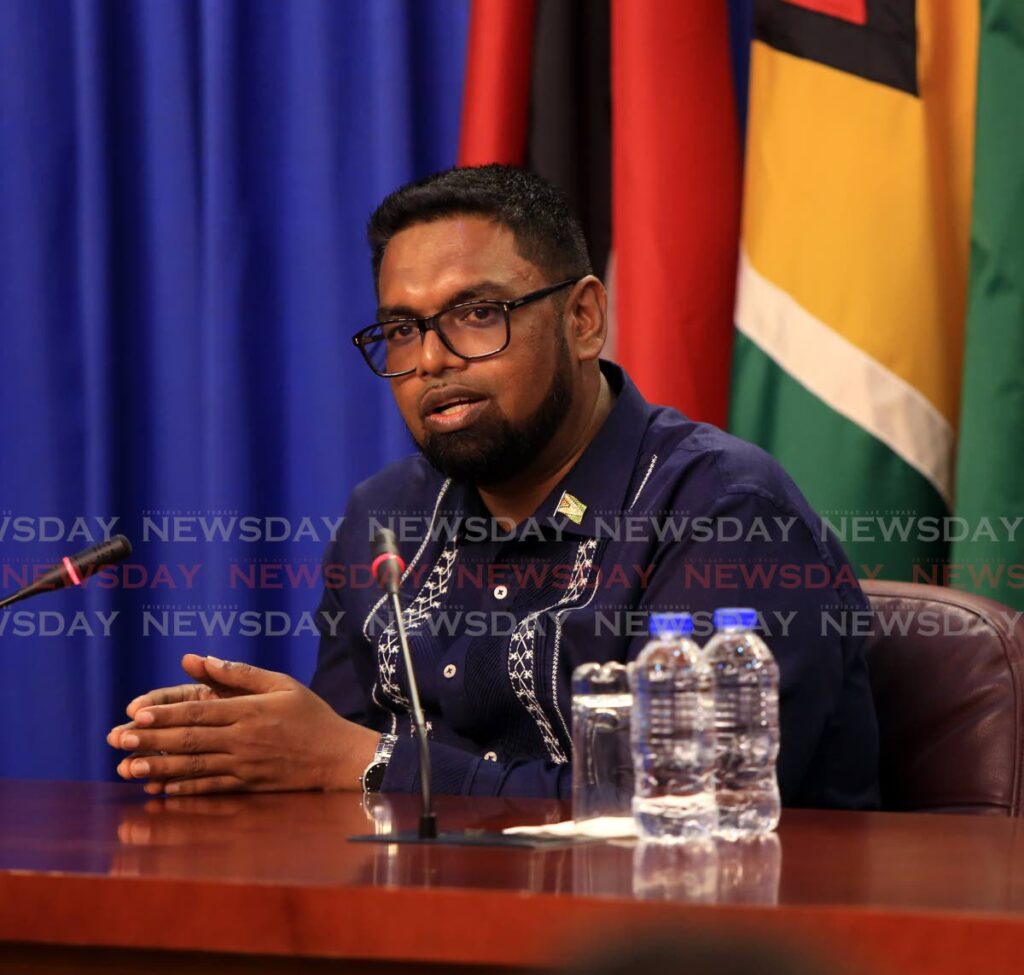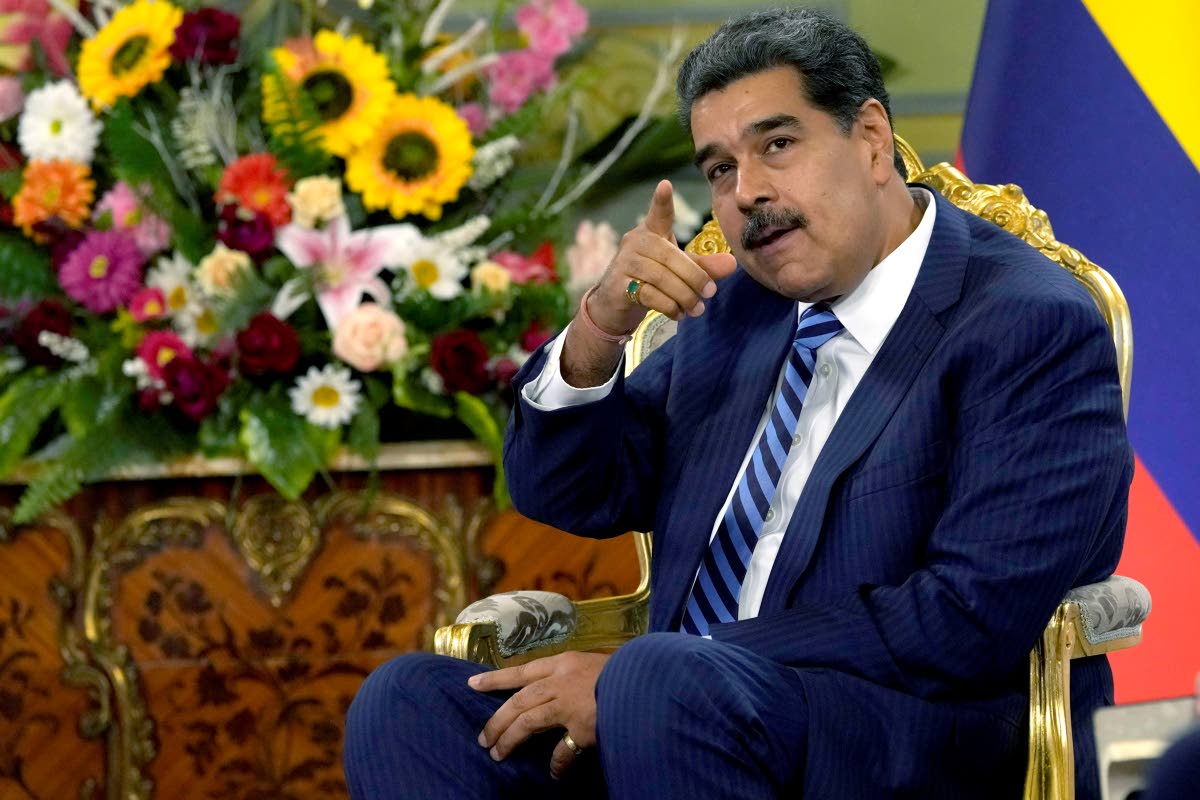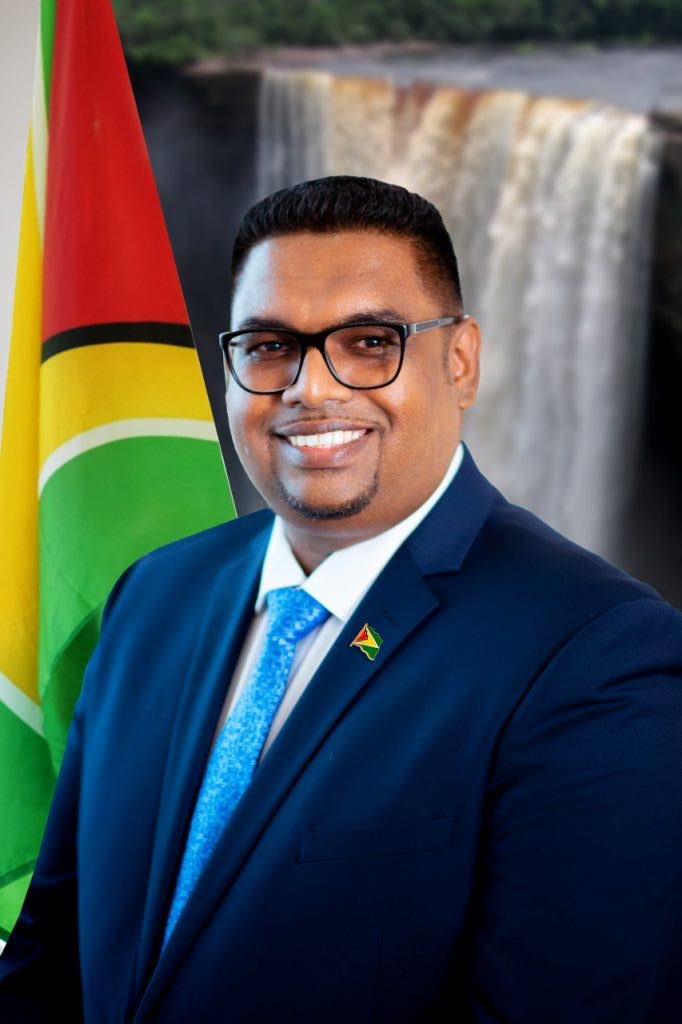[UPDATED] Guyana, Venezuela warn each other: This could incite violence

GUYANA President Irfaan Ali wants Venezuela to know that his country will not tolerate what he described as the latter's "unlawful and unfounded claims to more than two-thirds" of it.
He said Venezuela is trying to undermine Guyana's territorial integrity, and warned the move has the potential to incite violence and threaten peace in the Caribbean.
In a statement on Monday, Ali said his government had taken "careful note" of five questions issued by Venezuela's National Electoral Council, which are to be asked in the December 3 national referendum.
Among those questions, he said, is one that "brazenly seeks the approval of the Venezuelan people of the creation of a new Venezuelan State consisting of Guyana’s Essequibo region, which would be incorporated into the national territory of Venezuela, and the granting of Venezuelan citizenship to the population."
Ali said that is "nothing less" than an annexation of Guyana's territory and it is in "blatant violation of the most fundamental rules of the UN Charter, the OAS Charter and general international law.
"Such a seizure of Guyana’s territory would constitute the international crime of aggression."
He added, "The Government of Guyana categorically rejects any attempt to undermine the territorial integrity of the sovereign State of Guyana."
Ali said the idea that Essequibo region should be "created" into a state with Venezuela is abhorrent.
"Further, the government rejects the internationally unlawful act to put forward the ‘granting of citizenship and Venezuelan identity cards in accordance with the Geneva Agreement and international law.'"
He said no government or person has the right in international law to seize, annexe or take the territory of another country.
"The Government of the Cooperative Republic of Guyana calls the attention of the international community to the actions being carried out by the Government of the Bolivarian Republic of Venezuela which have the potential to incite violence and to threaten the peace and security of the State of Guyana and by extension the Caribbean region."
In a statement in direct response to Ali, the Venezuelan government said Ali's comments were offensive.
It said his statement was "loaded with profound contempt for the Venezuelan people, its Bolivarian history and its right to express itself in a democratic manner, on matters of special national importance.
"Guyana's statements, once again, are being drafted by the law firm employed by Exxon Mobil, a company that has corrupted the Latin American and Caribbean values of this nation and has bought off the Guyanese political class, dragging them into erratic actions, contrary to the public international law, with the objectives of appropriating energy resources that do not belong to it and attempting to threaten the peace and stability of Venezuela.
"Contrary to this nefarious anti-sovereign practice, the National Assembly of the Bolivarian Republic of Venezuela, in full exercise of its powers, has decided to consult the people of Venezuela, the main lines of legal, diplomatic and political actions, in order to enforce the legitimate rights over the territory of Guyana Essequibo."
It added that Ali's refusal to have diplomatic dialogue "threatens a dangerous escalation of a conflict of great dimensions, promoted by the US Southern Command.
"Venezuela...insists on urging the Guyanese government to desist from its actions, both unilateral and subordinate to transnational capital and to seriously assume direct negotiations that will allow for a practical and mutually acceptable agreement between the parties, to resolve the territorial controversy, as was agreed to with the UK of Great Britain just before the birth of Guyana as an independent nation."
History of the dispute
Venezuela believes its borders extend to east the Essequibo River.
The UN, on its website, said the dispute "is as a result of the Venezuelan contention that the Arbitral Award of 1899 about the frontier between British Guiana and Venezuela is null and void."
The disputed area is rich in gold, diamonds, timber and other natural resources.
The dispute was referred to the International Court of Justice in 2018 after a mediation effort failed.
Venezuela rejected this, arguing in that a 1966 agreement to resolve the controversy effectively nullified the original arbitration.
Last week, Guyana's Foreign Affairs Ministry said it had "taken careful note" of social media posts alleging the mobilisation of increased personnel and execution of military exercises by Venezuelan troops near its borders.
It added that Guyana's Defence Force was reviewing the reports, and the Venezuelan ambassador was called in "for an explanation.
"The ambassador claimed that the mobilisation of troops is geared towards curbing illegal mining operations, " it said.
Guyana's government also shared this information with other Caricom heads and international partners.
US State Department Assistant Secretary for Western Hemisphere Affairs Brian Nichols also recently showed support for Guyana.
In a post on X (formerly Twitter), he said Guyana has a sovereign right to develop its own resources.
"Efforts to infringe upon Guyana’s sovereignty are unacceptable...We call on Venezuela to respect international."
Venezuela's President Nicolas Maduro responded on X saying his country rejects the "insolent interference" by the US.
"It is an unacceptable conspiracy that seeks to strip us of the territorial rights that belong to the Venezuelan people.
"Rest assured that the truth will prevail over these vile pretensions and Bolívar's Venezuela will triumph," he wrote.
In 2021 when he was chairman of Caricom, the Prime Minister urged the region to "express its full support for Guyana" and "condemn acts of aggression by Venezuela" on this.
Dr Rowley said Caricom stands in defence of Guyana’s sovereign integrity and is advocating non-aggression, respect for international law and multilateralism.
Caricom maintains this position, now chaired by Dominica Prime Minister Roosevelt Skerrit.
Naparima MP Rodney Charles also called for the support of Guyana, saying TT has been silent.
"At the very least, TT must leverage our current good relations with Maduro to be an honest broker to help resolve the border dispute. We cannot sit idly by, do nothing and hope for the best. That will not be in our long term interest.
"Today it is Venezuela, tomorrow it could be TT."
Human rights activist and president of the local electoral commission for Venezuela Sofia Figueroa León called for legal solutions to the dispute.
She warned that Venezuela's current stance would cause more conflict than solutions.
"You cannot come and tell another sovereign country like Guyana that area is yours 100 years later.
"I think the international laws are there to comply with them," she told Newsday.
Newsday also tried to contact Rowley, Foreign and Caricom Affairs Minister Dr Amery Browne and the UN but no response was provided up to press time.
(BOX) The five questions Ali referred to:
1) Do you agree to reject by all means, in accordance with the law, the line fraudulently imposed by the Paris Arbitration Award of 1899, which seeks to deprive us of our Guyana Essequibo?
2) Do you support the Geneva Agreement of 1966 as the only valid legal instrument to reach a practical and satisfactory solution for Venezuela and Guyana regarding the controversy over the territory of Guyana Essequibo?
3) Do you agree with Venezuela's historical position of not recognising the Jurisdiction of the International Court of Justice to resolve the territorial controversy over Guyana Essequibo?
4) Do you agree to oppose, by all legal means, Guyana's claim to unilaterally dispose of a sea pending delimitation, illegally and in violation of international law?
5) Do you agree with the creation of the Guyana Essequibo state and the development of an accelerated plan for comprehensive care for the current and future population of that territory that includes, among others, the granting of citizenship and a Venezuelan identity card, in accordance with the Geneva Agreement and International Law, consequently incorporating said state on the map of Venezuelan territory?


This story has been adjusted to include additional details. See original post below.
GUYANA President Irfaan Ali wants Venezuela to know that his country will not tolerate what he described as the latter's "unlawful and unfounded claims to more than two-thirds" of it.
Ali said Venezuela is trying to undermine Guyana's territorial integrity, and warned the move has the potential to incite violence and threaten peace in the Caribbean.
In a statement on Monday, Ali said his government had taken "careful note" of five questions issued by Venezuela's National Electoral Council, which are to be asked in the December 3 national referendum.
Among those questions, he said, is one that "brazenly seeks the approval of the Venezuelan people of the creation of a new Venezuelan State consisting of Guyana’s Essequibo region, which would be incorporated into the national territory of Venezuela, and the granting of Venezuelan citizenship to the population."
Ali said that is "nothing less" than an annexation of Guyana's territory and it is in "blatant violation of the most fundamental rules of the UN Charter, the OAS Charter and general international law.
"Such a seizure of Guyana’s territory would constitute the international crime of aggression."
He added, "The Government of Guyana categorically rejects any attempt to undermine the territorial integrity of the sovereign State of Guyana."
Ali said the idea that Essequibo region should be "created" into a state with Venezuela is abhorrent.
"Further, the government rejects the internationally unlawful act to put forward the ‘granting of citizenship and Venezuelan identity cards in accordance with the Geneva Agreement and international law.'"
"It is by way of the Geneva Agreement and the principles of international law that the question of the validity of the Arbitral Award of 1899 has been put before the International Court of Justice. That Court has ruled that it has jurisdiction to hear this case. Guyana has repeatedly encouraged Venezuela to participate in the case."
He said no government or person has the right in international law to seize, annexe or take the territory of another country.
"The Government of the Cooperative Republic of Guyana calls the attention of the international community to the actions being carried out by the Government of the Bolivarian Republic of Venezuela which have the potential to incite violence and to threaten the peace and security of the State of Guyana and by extension the Caribbean region."
In a statement in direct response to Ali, the Venezuelan government said Ali's comments were offensive.
It said his statement was "loaded with profound contempt for the Venezuelan people, its Bolivarian history and its right to express itself in a democratic manner, on matters of special national importance.
"Guyana's statements, once again, are being drafted by the law firm employed by Exxon Mobil, a company that has corrupted the Latin American and Caribbean values of this nation and has bought off the Guyanese political class, dragging them into erratic actions, contrary to the public international law, with the objectives of appropriating energy resources that do not belong to it and attempting to threaten the peace and stability of Venezuela.
"Contrary to this nefarious anti-sovereign practice, the National Assembly of the Bolivarian Republic of Venezuela, in full exercise of its powers, has decided to consult the people of Venezuela, the main lines of legal, diplomatic and political actions, in order to enforce the legitimate rights over the territory of Guyana Essequibo."
It added that Ali's refusal to have diplomatic dialogue "threatens a dangerous escalation of a conflict of great dimensions, promoted by the US Southern Command.
"Venezuela...insists on urging the Guyanese government to desist from its actions, both unilateral and subordinate to transnational capital and to seriously assume direct negotiations that will allow for a practical and mutually acceptable agreement between the parties, to resolve the territorial controversy, as was agreed to with the UK of Great Britain just before the birth of Guyana as an independent nation."
The five questions Ali referred to:
1) Do you agree to reject by all means, in accordance with the law, the line fraudulently imposed by the Paris Arbitration Award of 1899, which seeks to deprive us of our Guyana Essequibo?
2.) Do you support the Geneva Agreement of 1966 as the only valid legal instrument to reach a practical and satisfactory solution for Venezuela and Guyana regarding the controversy over the territory of Guyana Essequibo?
3) Do you agree with Venezuela's historical position of not recognising the Jurisdiction of the International Court of Justice to resolve the territorial controversy over Guyana Essequibo?
4) Do you agree to oppose, by all legal means, Guyana's claim to unilaterally dispose of a sea pending delimitation, illegally and in violation of international law?
5) Do you agree with the creation of the Guyana Essequibo state and the development of an accelerated plan for comprehensive care for the current and future population of that territory that includes, among others, the granting of citizenship and a Venezuelan identity card, in accordance with the Geneva Agreement and International Law, consequently incorporating said state on the map of Venezuelan territory?

Comments
"[UPDATED] Guyana, Venezuela warn each other: This could incite violence"